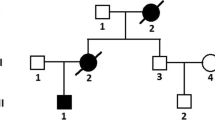Abstract
Aim
To report the genetic background of mannose-binding lectin (MBL)-deficiency in a patient with recurrent infections, cardiac disease, and myopathy.
Method
Case report.
Results
In a 47-year-old male with recurrent respiratory infections, MBL-deficiency was diagnosed. He additionally had developed left bundle-branch-block, ventricular runs, and dilative cardiomyopathy. Left ventricular (LV)-hypertrabeculation and intra-myocardial calcifications were detected earlier. At age 44 years, unclassified myopathy, manifesting as easy fatigability, myalgias, and ptosis was diagnosed. After death from a sepsis with Staphylococcus aureus, autopsy revealed endocardial fibrosis and calcification, located over the compacted as well as non-compacted segments. The patient carried the heterozygous haplotype LXA/LYB in the MBL gene. MBL-deficiency was considered responsible for recurrent pulmonary infections and sepsis. The association between MBL-deficiency, LV-hypertrabeculation, endocardial fibrosis, and calcification remains speculative.
Conclusions
MBL-deficiency due to the LXA/LYB genotype may be associated with recurrent pulmonary infections and fatal sepsis. Endocardial fibrosis and calcification results rather from LV-hypertrabeculation than MBL-deficiency.
Similar content being viewed by others
References
Tsutsumi A, Takahashi R, Sumida T (2005) Mannose binding lectin: genetics and autoimmune disease. Autoimmun Rev 4:364–372. doi:10.1016/j.autrev.2005.02.004
Eisen DP, Dean MM, Thomas P, Marshall P et al (2006) Low mannose-binding lectin function is associated with sepsis in adult patients. FEMS Immunol Med Microbiol 48:274–282. doi:10.1111/j.1574-695X.2006.00144.x
Gordon AC, Waheed U, Hansen TK, Hitman GA et al (2006) Mannose-binding lectin polymorphisms in severe sepsis: relationship to levels, incidence, and outcome. Shock 25:88–93. doi:10.1097/01.shk.0000186928.57109.8d
Worthley DL, Bardy PG, Mullighan CG (2005) Mannose-binding lectin: biology and clinical implications. Intern Med J 35:548–555. doi:10.1111/j.1445-5994.2005.00908.x
Mullighan CG, Heatley S, Doherty K, Szabo F et al (2002) Mannose-binding lectin gene polymorphisms are associated with major infection following allogeneic hemopoietic stem cell transplantation. Blood 99:3524–3529. doi:10.1182/blood.V99.10.3524
Zerefos PG, Ioannou PC, Traeger-Synodinos J, Dimissianos G et al (2006) Photoprotein aequorin as a novel reporter for SNP genotyping by primer extension-application to the variants of mannose-binding lectin gene. Hum Mutat 27:279–285. doi:10.1002/humu.20300
Salimans MM, Bax WA, Stegeman F, van Deuren M et al (2004) Association between familial deficiency of mannose-binding lectin and mutations in the corresponding gene and promoter region. Clin Diagn Lab Immunol 11:806–807. doi:10.1128/CDLI.11.4.806-807.2004
Wiertsema SP, Herpers BL, Veenhoven RH, Salimans MM et al (2006) Functional polymorphisms in the mannan-binding lectin 2 gene: effect on MBL levels and otitis media. J Allergy Clin Immunol 117:1344–1350. doi:10.1016/j.jaci.2006.01.031
Mullighan CG, Marshall SE, Welsh KI (2000) Mannose binding lectin polymorphisms are associated with early age of disease onset and autoimmunity in common variable immunodeficiency. Scand J Immunol 51:111–122. doi:10.1046/j.1365-3083.2000.00697.x
Garred P, Madsen HO, Hofmann B, Svejgaard A (1995) Increased frequency of homozygosity of abnormal mannan-binding-protein alleles in patients with suspected immunodeficiency. Lancet 346:941–943. doi:10.1016/S0140-6736(95)91559-1
Huang YF, Wang W, Han JY, Wu XW et al (2003) Increased frequency of the mannose-binding lectin LX haplotype in Chinese systemic lupus erythematosus patients. Eur J Immunogenet 30:121–124. doi:10.1046/j.1365-2370.2003.00370.x
Koch A, Melbye M, Sorensen P, Homoe P et al (2001) Acute respiratory tract infections and mannose-binding lectin insufficiency during early childhood. JAMA 285:1316–1321. doi:10.1001/jama.285.10.1316
Roy S, Knox K, Segal S, Griffiths D et al (2002) Pneumoccocal Surveillance Group. MBL genotype and risk of invasive pneumococcal disease: a case-control study. Lancet 359:1569–1573. doi:10.1016/S0140-6736(02)08516-1
Hibberd ML, Sumiya M, Summerfield JA, Booy R, Levin M (1999) Association of variants of the gene for mannose-binding lectin with susceptibility to meningococcal disease. Meningococcal Research Group. Lancet 353:1049–1053. doi:10.1016/S0140-6736(98)08350-0
Madsen HO, Videm V, Svejgaard A, Svennevig JL, Garred P (1998) Association of mannose-binding-lectin deficiency with severe atherosclerosis. Lancet 352:959–960. doi:10.1016/S0140-6736(05)61513-9
Conflict of interest statement
There are no funding sources. None of the authors have any conflicts of interests.
Author information
Authors and Affiliations
Corresponding author
Rights and permissions
About this article
Cite this article
Finsterer, J., Stöllberger, C. & Wolf, H.M. Heterozygous promotor haplotype LXA/LYB in MBL-deficiency associated with myopathy and left ventricular hypertrabeculation/noncompaction. Ir J Med Sci 180, 909–911 (2011). https://doi.org/10.1007/s11845-009-0309-5
Received:
Accepted:
Published:
Issue Date:
DOI: https://doi.org/10.1007/s11845-009-0309-5




